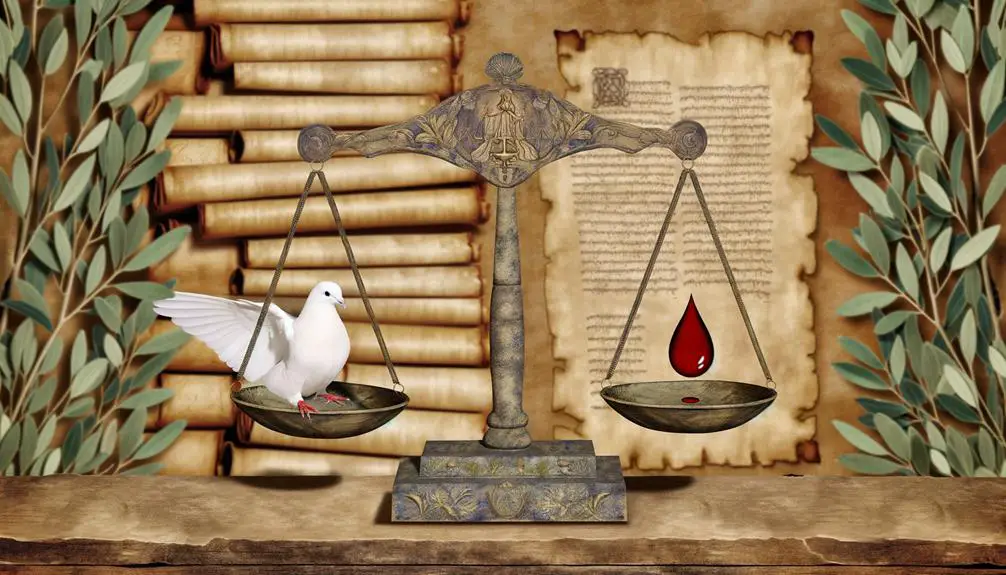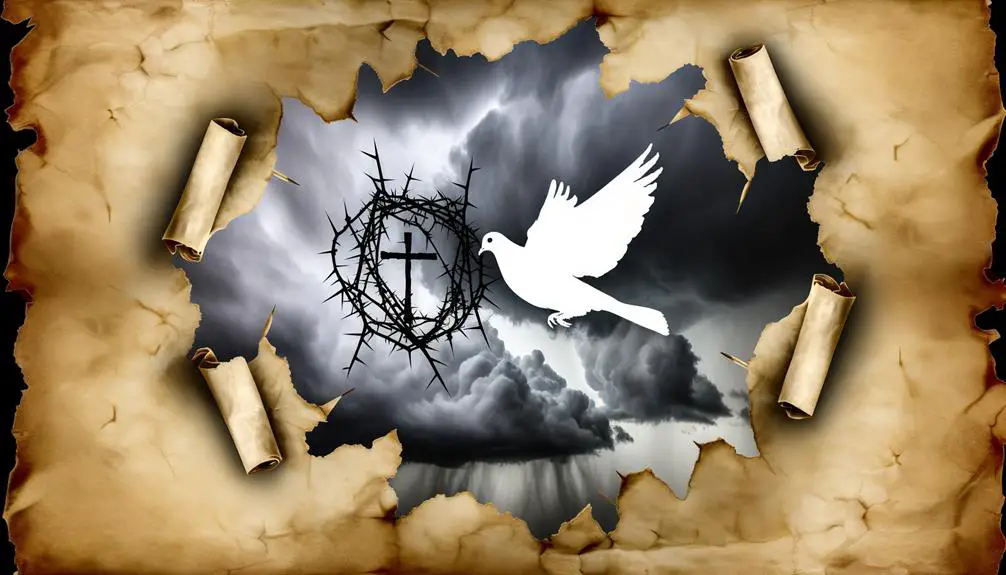Discover the profound significance of innocent blood in the Bible, a theme that weaves through tales of guilt, redemption, and divine justice.

Innocent Blood in the Bible
From the first cry of Abel's blood from the ground to the haunting echo of the slaughter of the innocents, the Bible is steeped in narratives of innocent blood being spilled. You'll find these stories not only chronicle acts of violence but also carry deep theological implications about guilt, redemption, and divine justice.
As you explore these tales, you'll uncover layers of meaning that might challenge your understanding of innocence and its price. What you'll discover next could change the way you view some of the most pivotal moments in biblical history.
Key Takeaways
- The Bible condemns violence and exploitation, especially against the innocent and defenseless.
- Abel's blood symbolizes divine justice seeking reparation for the wrongful shedding of innocent blood.
- Biblical law differentiates between intentional and unintentional killing, highlighting the sanctity of life.
- Child sacrifices and similar practices are denounced, emphasizing the protection and value of vulnerable populations.
The Story of Abel

Why does the story of Abel stand as a pivotal moment in the biblical narrative? It marks the inception of a recurring theme: the disruption of fraternity and the consequences of sin that ripple through generations. This episode doesn't just serve as a tragic tale of jealousy and murder; it's a profound exploration of fractured relationships and the loss of innocence, underscored by rich pastoral imagery.
You'll find that the pastoral imagery used in Abel's story isn't merely decorative. It's symbolic, representing purity, simplicity, and a life in harmony with God's creation. Abel, a keeper of sheep, embodies these qualities. His occupation and his righteous offering, accepted by God, contrast sharply with Cain's agricultural pursuits and unacceptable sacrifice. This juxtaposition isn't just about professions but reflects deeper moral and spiritual divides.
The fracture of the fraternal bond between Cain and Abel is a critical juncture. It's the first instance of human-on-human violence in the biblical text, setting a precedent for future narratives of conflict, betrayal, and redemption. This fratricide isn't just a personal failure but a communal tragedy, illustrating how sin disrupts the foundational relationships that should unite humanity.
Through the story of Abel, you're invited to ponder the fragility of fraternity in the face of envy and malice. It's a cautionary tale, highlighting the ease with which bonds can be broken and the profound impact of such ruptures on the social and spiritual order. This narrative, rich in pastoral imagery and moral complexity, serves as a foundational lesson on the consequences of sin and the importance of maintaining harmony and righteousness in human relations.
The Cry of the Innocents

You must consider how the narrative of Abel's blood in the Bible transcends a mere historical account to embody a broader condemnation of innocence lost.
This condemnation is further exemplified through the explicit biblical disapproval of child sacrifices, reflecting a societal shift towards valuing the sanctity of life.
These themes underscore a complex interplay between divine justice and human morality, inviting a deeper analysis of biblical texts' ethical dimensions.
Abel's Blood Speaks
In the biblical narrative, Abel's blood metaphorically cries out from the ground, symbolizing the perennial outcry of the innocents against injustice and violence. This voice symbolism serves as a powerful testament to the Earth's witness of human actions, especially those marked by violence against the blameless.
Abel's blood, as recorded in Genesis, thus becomes not just a narrative detail but a profound emblem of divine justice seeking reparation for wrongs committed. It encapsulates the notion that the earth itself, as a silent observer, holds the memory of innocent bloodshed and, through divine intervention, demands accountability.
This concept underscores the biblical condemnation of violence, aligning with the broader theme of seeking justice for the oppressed and providing a voice to those who can't speak for themselves.
Child Sacrifices Condemned
Building on the theme of divine justice for the innocent, the condemnation of child sacrifices in the Bible further illustrates the profound moral and ethical stance against the exploitation and harm of the vulnerable. This stance offers:
- A clear denunciation of practices that harm the most defenseless in society.
- An ethical framework that prioritizes the protection of children.
- A basis for modern parallels in the fight against the exploitation and abuse of minors.
- Insights into the ethical implications of valuing all human life, irrespective of age.
Analyzing these elements reveals a timeless message against the commodification of human life, urging societies to reflect on current practices that may echo such archaic injustices. This analysis not only highlights the Bible's historical context but also its relevance in discussing contemporary ethical dilemmas.
Bloodguilt in Biblical Law

While exploring the concept of bloodguilt within Biblical law, it's crucial to understand how these ancient statutes framed moral and legal responsibility for causing death. Biblical law delineated clear distinctions between intentional and unintentional killing, each with its own set of repercussions. This differentiation underscores the nuanced approach to justice and the value of life that permeates these texts.
Central to the handling of bloodguilt was the institution of capital punishment for premeditated murder. This severe penalty reflected the gravity with which intentional shedding of innocent blood was viewed. The life of the perpetrator was seen as forfeit in a direct application of the lex talionis, or law of retaliation, which sought to balance the scales of justice by ensuring that the punishment mirrored the crime. However, capital punishment wasn't arbitrary or vengeful but was administered within a legal framework that demanded thorough investigation and credible evidence, often requiring the testimony of multiple witnesses.
For unintentional manslaughter, Biblical law provided a merciful alternative to retributive justice through atonement rituals and the establishment of cities of refuge. These sanctuaries allowed the accidental killer to live without fear of avenging relatives, so long as they remained within the city's boundaries until the death of the high priest. Atonement rituals, involving various offerings and ceremonies, played a crucial role in absolving individuals from bloodguilt, restoring communal harmony, and reconciling the individual with the divine.
This sophisticated approach to bloodguilt illustrates the complex interplay between divine commandment, communal welfare, and individual responsibility in Biblical law, highlighting a system that sought to uphold the sanctity of life while ensuring justice and societal order.
David and Uriah's Tale

Amidst the annals of Biblical narratives, the story of David and Uriah stands out as a poignant exploration of power, betrayal, and the devastating consequences of sin. This tale encapsulates the darker aspects of human nature, illustrating the lengths to which individuals might go to cover their transgressions. It serves as a critical examination of royal deception and military strategy, providing a stark lesson on the cost of sin, especially when wielded by those in power.
To paint a picture for the audience, consider the following aspects:
- Royal Deception: King David, upon coveting Bathsheba, Uriah's wife, devises a plan to conceal his sin. His initial attempts to mask the adultery fail, leading to a deeper descent into deceit.
- Military Strategy: As his scheme intensifies, David orders Uriah to the frontline of battle, ensuring his death. This act of manipulating military maneuvers for personal gain marks a profound abuse of royal authority.
- Betrayal of Trust: Uriah, a loyal soldier, is betrayed by the very king he serves. This betrayal isn't just personal but disrupts the moral and social fabric of the kingdom.
- Consequences of Sin: The aftermath of Uriah's death and David's actions have far-reaching implications, affecting not only their immediate circle but also setting a precedent for divine judgment and moral reckoning within the scripture.
Analyzing David and Uriah's tale invites reflection on the themes of power, moral integrity, and the enduring impact of our choices. It underscores the Biblical warning against the corrupting influence of power and the importance of accountability in leadership.
Prophetic Denunciations

You'll find that the Bible's prophets often stand in opposition to violence, articulating a clear condemnation of it. They advocate for divine justice, emphasizing the need for accountability and righteousness.
This perspective is crucial in understanding the ethical and moral fabric that underpins biblical narratives.
Prophets Condemn Violence
Throughout the texts of the Bible, prophets consistently denounce violence, articulating divine commands for peace and justice in human societies. Their messages, steeped in peaceful teachings, navigate the ethical dilemmas faced by communities and individuals alike. To understand their stance, consider the following points:
- Prophets as Advocates: They position themselves as divine messengers, urging societies towards empathy and non-violence.
- Ethical Frameworks: Their teachings provide moral guidelines, emphasizing the value of life and the importance of peaceful coexistence.
- Social Justice: They condemn oppression and violence, advocating for the rights and dignity of the marginalized.
- Spiritual Accountability: Highlighting the spiritual consequences of violence, they call for repentance and a return to righteous living, thus fostering a culture of peace and reconciliation.
Divine Justice Advocated
Building on the prophets' advocacy for peace, they also articulate a strong stance on divine justice, denouncing acts that contravene moral and spiritual laws. This emphasis on divine retribution serves as a critical mechanism for addressing ethical dilemmas within the texts, highlighting the inextricable link between morality and spirituality.
Theme |
Impact |
|---|---|
Divine Retribution |
Serves as a deterrent against moral transgressions |
Ethical Dilemmas |
Forces a reevaluation of personal and societal values |
Moral Responsibility |
Encourages adherence to spiritual laws |
Spiritual Integrity |
Ensures the community's alignment with divine will |
These elements collectively reinforce the prophetic denunciation of violence and injustice, advocating for a society where divine justice prevails over wrongdoing, and where ethical considerations guide actions, ensuring peace and moral integrity.
The Sacrifice of Isaac

The Sacrifice of Isaac, a pivotal event in biblical narrative, underscores profound themes of faith, obedience, and divine intervention. This story, found in the book of Genesis, presents a complex interplay between divine command and human action, challenging you to contemplate the depths of faith tested and obedience exemplified. Here, Abraham's unwavering faith in God is put to the ultimate test, an ordeal that paints a vivid picture of devout submission and the complexities of divine will.
To understand this event's significance, consider the following points:
- Faith Tested: Abraham's faith is profoundly tested when God commands him to sacrifice his son, Isaac. This test goes beyond mere obedience, probing the depths of Abraham's trust in God's promises.
- Obedience Exemplified: Despite the harrowing nature of the command, Abraham proceeds with unwavering obedience. His actions epitomize the submission and reverence towards God that's central to the narrative.
- Divine Intervention: At the moment of sacrifice, an angel of the Lord intervenes, providing a ram as a substitute for Isaac. This act not only spares Isaac's life but also reinforces the notion of divine provision and mercy.
- Covenant Affirmed: The event culminates in the reaffirmation of God's covenant with Abraham, promising blessings and multiplication of his descendants. This reaffirmation underscores the reciprocal nature of faith and obedience within the covenantal relationship.
Analyzing the Sacrifice of Isaac through these lenses offers you a nuanced understanding of its theological implications, highlighting the intricate balance between divine sovereignty and human agency within the biblical text.
The Slaughter of the Innocents

In examining the Slaughter of the Innocents, one encounters a deeply troubling episode that starkly contrasts with the earlier narrative of divine intervention to preserve life. This event, rooted in Herod's decree, illustrates a dire expression of power and fear. Historical context is crucial to understanding the magnitude and motivations behind this act.
Herod, the ruler of Judea, issued a decree for the mass murder of all male infants in Bethlehem, aiming to eliminate the foretold newborn king, Jesus. This decree wasn't merely a display of tyrannical power; it was a calculated political move designed to maintain his rule and quell any threats to his throne. The historical context of Roman-occupied Judea, where political unrest and aspirations for liberation were rampant, sheds light on why Herod felt compelled to commit such an atrocity. His reign was marked by paranoia and brutality, traits that led him to view the prophecy of a new king as an existential threat.
Analyzing this episode, it's clear that Herod's actions were driven by more than mere cruelty; they were a manifestation of the politics of fear and control. This incident, while horrific, provides insight into the complexities of power dynamics in biblical times. It underscores the lengths to which rulers would go to secure their positions, often at the expense of innocent lives. The Slaughter of the Innocents, therefore, serves as a poignant reminder of the vulnerability of the innocent in the face of political machinations and the tragic consequences of unchecked power.
Redemption and Innocence

Exploring the theme of redemption and innocence, it's essential to recognize how these concepts intertwine with the broader narratives found within biblical texts, offering profound insights into the human condition and divine grace. The biblical portrayal of innocence often aligns with moral purity and is intricately linked with the mechanisms of redemption. Atonement symbolism, deeply embedded in the fabric of these narratives, serves as a crucial bridge between human fallibility and the possibility of divine reconciliation.
To paint a clearer picture, consider the following aspects:
- Moral Purity: Innocence in the biblical sense frequently transcends the mere absence of guilt, embodying a state of moral purity that humans continually strive towards. This pursuit isn't merely self-driven but is often depicted as being guided by divine principles.
- Atonement Symbolism: The ritualistic sacrifices and offerings described in the Old Testament, particularly the use of unblemished lambs, underscore the symbolism of innocence and purity necessary for atonement. Such imagery prefigures the ultimate act of redemption through Christ's sacrifice in the New Testament.
- Divine Grace: The concept of redemption is inextricably linked with divine grace. It isn't human innocence alone that restores righteousness but the gracious act of divine intervention, offering a path to reconciliation despite human imperfection.
- Human Condition: The narratives of redemption and innocence reflect on the human condition, highlighting the tension between moral frailty and the yearning for purity. This duality underscores the biblical message of hope and restoration through faith.
In essence, the interplay between redemption and innocence within the Bible reveals a profound theological understanding of moral purity and atonement symbolism, offering insights into the path from human fallibility to divine grace.
Frequently Asked Questions
How Does the Concept of Innocent Blood in the Bible Compare to Similar Notions in Other Ancient Religious Texts?
When you explore comparative mythology, you'll find that the idea of innocent blood spans across various ancient religious texts, not just one.
This concept often serves to highlight ethical parallels between different cultures, showing a shared understanding of innocence and guilt.
Are There Any Rituals or Practices Prescribed in the Bible Specifically for Atoning for the Shedding of Innocent Blood?
You'll be blown away by the biblical procedures for cleansing oneself after the act of shedding innocent blood. The Bible intricately outlines rituals aimed at restoring ritual purity, emphasizing sacrificial symbolism.
These rituals serve not only as a means of atonement but also as a profound reflection on the value of life and the grave consequences of taking it unjustly. Analyzing these practices offers deep insights into ancient perspectives on guilt and redemption.
How Have Interpretations of the Theme of Innocent Blood in the Bible Evolved Over the Centuries Among Different Christian Denominations?
You've seen theological debates shift and morph, as denominational perspectives on themes evolve.
When delving into how interpretations have changed, it's clear that each Christian denomination has navigated the concept with unique doctrinal lenses.
These discussions aren't static; they've been influenced by historical contexts, scholarly interpretations, and evolving societal norms.
This dynamic discourse showcases the complexity of religious texts and the varied ways believers seek to understand and apply their teachings.
What Psychological or Moral Implications Does the Shedding of Innocent Blood Have on Characters in the Bible, Beyond Legal or Divine Retribution?
When characters in literature face the consequences of shedding innocent blood, their character development often undergoes significant changes, marked by deep emotional repercussions. This act not only affects their moral compass but also triggers profound psychological turmoil.
These emotional consequences can lead to a reevaluation of personal values and actions, illustrating the complex interplay between guilt, redemption, and moral accountability in shaping a character's journey and growth.
In What Ways Has the Theme of Innocent Blood in the Bible Influenced Modern Legal Systems and Concepts of Justice?
You'll find that the theme of innocent blood has significantly influenced modern legal systems and concepts of justice.
It's led to the development of modern accountability measures and judicial reforms aimed at preventing the miscarriage of justice.
This focus ensures that the innocent are protected, and the guilty are held accountable, reflecting a deep-seated value of fairness and integrity in legal proceedings, inspired by historical and cultural narratives.
Conclusion
In your journey through the Biblical landscape, you've traversed valleys shadowed by guilt and climbed mountains drenched in the innocence of blood. From Abel's silent plea to the haunting echoes of the innocents, these narratives weave a tapestry of moral complexity and divine justice.
Like a river, the concept of innocent blood courses through scripture, reflecting the multifaceted nature of redemption and human frailty. This exploration illuminates not just historical beliefs but also the enduring quest for understanding in the human heart.



Sign up